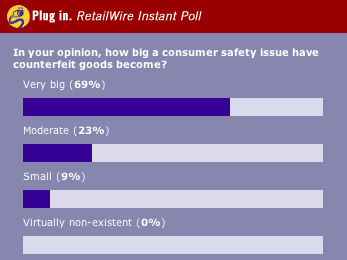By
George Anderson, Editor-in-Chief, RetailWire
Too
often when the discussion of counterfeit
goods comes up, there is an emphasis on
topics such as intellectual property rights
and the profits lost by major corporations.
Recent events, however, suggest that the
real issue at hand is the safety of consumers.
Fake
pharmaceuticals, toothpaste, infant formula,
extension cords and batteries are just a
few of the products that have made their
way into unsuspecting consumers' homes with
deadly consequences.
A
recent article in The Toronto Star
discussed the experience of a senior Royal
Canadian Mounted Police official who was
given a pack of counterfeit batteries by
a subordinate to illustrate the types of
goods coming into the country, in this case,
from China. A few months after receiving
them, the batteries exploded inside the
RCMP official's desk. The sound was compared
to that made when a gun goes off.
The
increase in fake goods hitting markets in
North America has been staggering and low
budgets and a lack of personnel have made
it nearly impossible to keep these potentially
dangerous items out of the hands of consumers.
In
May, the Food and Drug Administration issued
a press release that said it had identified
three occasions when consumers had purchased
counterfeit versions of the weight loss
drug Xenical. Testing showed that none of
the products contained orlistat, the active
ingredient in Xenical. Some of the samples
tested contained talc and starch as ingredients.
While
China has been the focus of many international
counterfeit fighting actions, and certainly
many recent news reports, it is far from
being the only country with criminals seeking
to make a buck on a legitimate brand's reputation.
Earlier this month, Unilever signed a deal
with the Algerian customs director general
to share information and step up efforts
to prosecute counterfeiters.
Discussion Question
for the BrainTrust panel:
How
big a problem, in terms of lost sales and
profits, have counterfeit goods become for
law-abiding retailers? What has been the
impact on manufacturers? What should retailers
and suppliers be doing to combat counterfeiting?
RetailWire
Instant Poll Results:

RetailWire BrainTrust Comments:
It's
easy to blame counterfeits for health and
quality dangers. However, many retailers
require their suppliers to list the retailers
on their product liability insurance ACORD
forms, so the retailers are covered, not
just the suppliers. Given the alleged huge
volume of counterfeits, no one has proven
that the dangers are statistically greater,
compared to genuine products. Even the most
reputable brands (Apple, Motorola, Sony)
have recalls from time to time.
-
Mark Lilien, Consultant, Retail Technology
Group
...Counterfeiting
and piracy are huge issues with regard to
lost sales by manufacturers and retailers,
so what is happening is that business is
now smartly using the safety issue to finally
get tougher legislation and enforcement
around piracy, including in one bill, tough
sanctions against citizens who bring counterfeit
goods purchased overseas into the country
(a bad idea, in my opinion).
-
Dan Gilmore, Editor, SupplyChainDigest
Dellmart & Company President,
W. Frank
Dell II , Says :
|
 The
most common entry into the food store
for counterfeit merchandise is through
the diverting channel, so additional
controls are required there. Retailers
must keep their house clean. The
most common entry into the food store
for counterfeit merchandise is through
the diverting channel, so additional
controls are required there. Retailers
must keep their house clean.
What do you
say? Send
us your comments here |
While
working in Russia, we explored the concept
of bringing American jeans into the country
as there was great demand. When we looked
at what was being sold, it was almost all
fake [brand] jeans from China, thus no market
for American manufacturers. Now, this is
happening with food and drug products. Retailers
must only buy from the valid supplier.
The
most common entry into the food store for
counterfeit merchandise is through the diverting
channel, so additional controls are required
there. Retailers must keep their house clean.
An
internet sale of counterfeit merchandise
does damage to the brand and is thus an
issue that manufacturers must resolve. The
use of RFID through the supply chain will
likely be a longer term solution.
-
W. Frank Dell II, CMC, President, Dellmart
& Company
In
the U.S., counterfeiters have found a haven
targeting recent immigrants like the Hispanic
consumer. It has been blatant, or as subtle
as changing a letter on the name brand,
a logo, or a color.
Considering
the size of the market, the projections
of growth, and the liabilities in brand
erosion or worst, it is imperative manufacturers
are aware of all distribution channels and
critical for them to communicate the genuine
brand attributes to consumer and trade.
-
Carlos Arambula, Managing Partner, Arambula-Phillips
Comm, Inc.
If
the retailers refused to buy the counterfeit
goods, the counterfeiters would stop producing
the product, and the companies importing
the products would change their business
practice.
I
recently visited a major retailer in the
U.S. selling a "branded" item
at 1/3 the cost of the normal price. On
closer inspection, the product had an incorrect
spelling on the back of the package. When
I pointed this out to the store manager,
he said that they carried the product all
of the time, and that it was from a "different
country" than the actual brand.
When
retailers are unwilling to sell the product,
the problem in the U.S. will start to dissipate.
-
Joel Warady, Principal, Joel Warady Group
Read
the entire story and RetailWire discussion
at:
http://www.retailwire.com/Discussions/Sngl_Discussion.cfm/12292
Get
Plugged in with RetailWire.
Membership
in RetailWire.com
is free to all retail and related industry
professionals. Simply go to www.retailwire.com
and click the FREE REGISTRATION button.
|